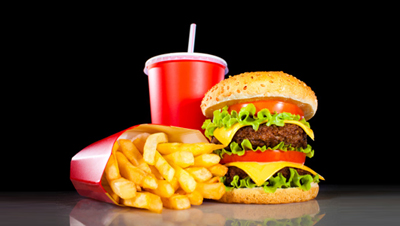
We know junk food is bad for us, nutrition-wise. It doesn’t have enough of the beneficial things you need like vitamins, minerals, enzymes, and antioxidants. Junk food also tends to be high in sugar and the bad kinds of fat. So why do we insist on eating junk food anyway?
The answer to that question is surprisingly complex. If other people eat junk food, we tend to want some too. Then there’s the issue of being saturated with advertisements urging us to eat cheese burgers, fries, potato chips, and cookies night and day.
Many experts say our addiction to junk food is tied to the way we deal with stress. Stressful situations lead us to find solace in carbohydrates and fats. It’s how we try to comfort ourselves.
Then of course, there’s the actual physiological changes that take place in the brain when we are stressed out. Stress can trigger the release of endogenous opioids in the brain.
Endogenous opioids are neurotransmitters that behave much like opiates—they have the same addictive properties and structure as these drugs. Endogenous opioids can make you reach for addictive foods—mostly those high in sugar, salt, and fat.
Stress activates another important area in the brain called the endocannabinoid system that can trigger an irresistible case of the munchies.
As well, a neuropeptide called “neuropeptide Y” is activated by stress. This neuropeptide is directly linked to cravings for sugar and fat.
You may be wondering why the brain responds this way to stress. In most animals, stress is caused by real physical danger.
An animal may have to flee for its life from a predator. After pushing the body to its physical limits, the brain signals the body to load up on foods high in carbs and fats.
In modern day society, however, humans aren’t running for their lives. Instead, they are sitting at desks getting stressed out for emotional reasons. There’s no big calorie-burn before the brain triggers the desire to eat foods high in calories.
But, knowing all this, what’s the big deal if you eat junk food occasionally? After all, if you intersperse junk food with healthy foods like salads and whole grains, won’t you cancel out any harm the junk food might have done?
Maybe not, according to a recent study. Researchers at the University of New South Wales have found that eating junk food high in sugar and fat for just one week can trigger permanent damage to the brain.
For their study, the Australian researchers fed rats a “cafeteria diet” for one month. A second group of rats were fed a standard diet and acted as a control.
The researchers discovered that the rats eating the junk food diet had an almost immediate difficulty in their cognitive abilities.
The rats were unable to recognize when an object was moved to a new location. The rats also showed inflammation in the hippocampal region of their brains—an area responsible for spatial memory.
Perhaps the most alarming outcome of the study was that the damage done to the brain couldn’t be reversed by switching back to a healthy diet.
This is just more convincing evidence that you should really try to find healthy substitutes for all your junk food cravings. Healthy foods can also be comfort foods, though most food manufacturers won’t advertise this fact—you’ll have to discover this for yourself!
Sources:
Ravensthorpe, M., “A short-term diet of junk food can irreversibly damage memory, study finds,” Natural News web site, Jan. 12, 2014; http://www.naturalnews.com/043482_junk_food_memory_loss_cognitive_impairment.html, last accessed Jan. 15, 2014.
Beilharz, J.E., et al., “Short exposure to a diet rich in both fat and sugar or sugar alone impairs place, but not object recognition memory in rats,” Brain Behav Immun. December 3, 2013.













